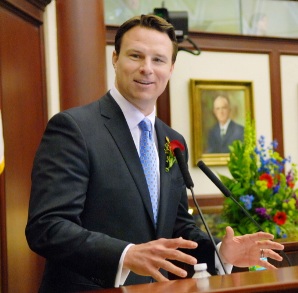Florida House Speaker Uses His Unique Upbringing To Craft Education Policy

Meredith Geddings/myfloridahouse.gov
Speaker Will Weatherford says the House budget will likely include $1 billion in additional funding for K-12 education.
Florida House Speaker Will Weatherford is a big proponent of nontraditional education.
Weatherford is pushing for an online state university in Florida, and he encourages families to consider different ways of learning besides district-run brick and mortar public schools.
He’s a strong supporter of charter schools and the parent trigger bill, which enables parents to petition for changes at chronically failing schools.
The Florida Education Association – the teachers union – says of the parent trigger: “We need to invest in the classroom priorities that build a foundation for student learning rather than simply turning our children, our school buildings and our tax dollars over to profit driven corporations and hoping for the best.”
But in an interview with StateImpact Florida last week, Weatherford said he was shocked that anyone would want to defeat the parent trigger bill.
“All it does is give parents a say in making sure their children get a quality education,” Weatherford said.
He says he and his wife haven’t decided yet on schooling for their three daughters. His oldest, not yet in kindergarten, currently attends a private Christian school.
Here’s more from our interview with Speaker Weatherford:
Q: On the opening day of session, you encouraged lawmakers to “break free from a narrow vision of education that has encouraged a culture of mediocrity.” What did you mean by that?
A: What I was speaking about in that reference was our higher education system.
I think in education in general we have got to start thinking outside the box. Technology is allowing us to do things in education we never thought possible. We’re now able to give people the highest quality of education and put it in the comfort of someone’s home.
So I think the concepts we’re talking about with having an online university through one of our existing universities is going to make a very high quality product extremely affordable for Floridians, and I think it’s going to change the game for how people learn.
Q: Your education was a bit unconventional growing up. Tell us about your early years.
A: I come from a really big family of 9 children. My mom made the determination early on that she wanted to home school us, at least most of us, through middle school.
The thing about home schooling is, by the time it hits noon, you’re done and can accomplish more than you would in a full day at school. So it was a very unique upbringing. I then went to private school – most of us did for a year or two – and then public school for high school.
We all played sports, and so back then — that was before what we call the Tebow Law — if you home school, you can actually play sports at your local public school, but that didn’t exist back when I was in school. So it was a chance for us to compete, and it was a very diverse educational background.
I think it certainly kind of framed my world view about empowering parents and allowing them to have the education that really fits their children’s needs the best.
Q: I want to ask you about a couple of bills that have had some controversy around them.
The charter school bill seeks money for maintenance and facilities, and it would allow charters to use school buildings that are vacant.
The bill that’s been nicknamed the parent trigger gives parents at chronically failing schools to petition the school board for significant changes, including making that school into a charter.
Critics are concerned about taxpayer dollars being used for private corporations that operate these public charters. Why do you think critics should not be concerned?
A: Anytime you can empower a family and give them more options for their student, their child, that’s a good thing.
With regard to what people call the parent trigger – some people call the parental empowerment bill:
The idea is if you happen to live in a zip code where that local school that your child would go to is a habitually failing school, [if] it’s an F school year after year, we want to give those parents an opportunity to go to the school board and say, this is unacceptable. It’s time to make a change. Either change the staff, turn it into a charter school, do something.
We know for a fact, we have data that shows children learn differently. One student learns differently from another.
By giving parents and kids more choices, you’re kind of allowing them to find that form of education that they’re really looking for and that will help them aspire to be what they can be.
I think technology and choice and accountability – mixing those three things in together is changing the landscape of how we educate.
Q: Budget decisions are being made now. Will lawmakers have to choose between the teacher raises that Gov. Rick Scott has proposed and technology upgrades in the classroom? Each will cost almost $500 million. Do you think that’s a choice you’ll have to make?
A: I think we’re going to prioritize FEFP (Florida Education Finance Program) funding, which predominantly goes to teacher pay. You’ll see a big increase in teacher pay this year.
I think we’re going to hopefully put about a billion dollars into education on top of what we’ve funded in the past. (Read here for Weatherford’s explanation about why lawmakers can’t tell districts how to dole out teacher raises.)
But no, I don’t think you’re choosing one or the other. You’ve got to kind of build the infrastructure first. You can’t buy computers if you don’t have a good wireless internet.
I think we can do both and fund teachers appropriately.

